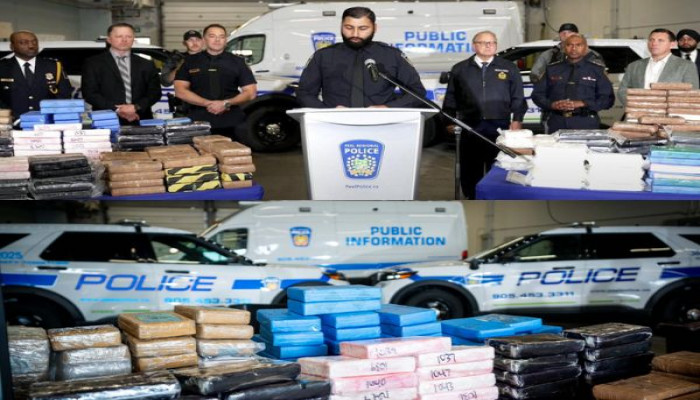Project Pelican: $50 million drug bust uncovers ISI-Khalistani nexus in Canada
- In Reports
- 08:38 PM, Jun 11, 2025
- Myind Staff
Seven South Asians, including several Sikhs, who were supported by ISI and Khalistani networks, were arrested in Ontario, Canada. Peel Police made the arrests during their largest drug seizure operation, named Project Pelican. Officers seized nearly $50 million worth of cocaine during the bust.
Project Pelican exposed a well-organised transnational drug network. The network had direct ties to ISI-backed Khalistani operatives based in Canada. Top Indian intelligence sources stated that the network posed a significant threat to North American security and India-Canada relations. They linked it to drug trafficking, political lobbying, and terror funding.
Peel Regional Police seized 479 kilograms of cocaine valued at $47.9 million and arrested nine individuals, including several of Punjabi origin. The drugs had been smuggled from Mexico using US commercial trucking routes into Ontario. Officers made key interceptions at the Ambassador Bridge in Windsor and the Blue Water Bridge in Sarnia. Collaboration with US Homeland Security, the DEA, and the RCMP revealed links to Mexican cartels and US-based distributors, which prompted further investigations.
Peel Regional Police stated in a media release that they, along with national and international partners, dismantled a transnational organised criminal network that trafficked illicit drugs into the Greater Toronto Area.
As of June 6, police arrested and charged Manpreet Singh, 44, from Brampton; Arvinder Powar, 29, from Brampton; Karamjit Singh, 36, from Caledon; Gurtej Singh, 36, from Caledon; Sartaj Singh, 27, from Cambridge; Shiv Onkar Singh, 31, from Georgetown; Sajgith Yogendrarajah, 31, from Toronto; Philip Tep, 39, from Hamilton; and Hao Tommy Huynh, 27, from Mississauga. They face 35 charges related to firearm and drug offences.
According to intelligence sources, an ISI blueprint existed within the cartel. They said ISI funded Khalistani groups in Canada to traffic Afghan heroin and Mexican cocaine. They used the proceeds to finance anti-India activities, including protests and referendums. The sources named the International Sikh Federation as one of the groups running the drug operations. They collaborated with cartels to import heroin through Punjab and export refined drugs like cocaine and ICE to India.
Sources said Khalistani elements had also infiltrated Canadian politics, including the Liberal Party. They alleged that ISI agents such as Bilal Cheema funded politicians. They claimed Khalistani leaders exploited immigration routes to extort students and push anti-India propaganda. Agencies directly linked these activities to Project Pelican.
Sources also said Punjabi gangs with Khalistani links controlled cross-border trucking in Canada. These gangs played a central role in Project Pelican’s drug movement. They used logistics hubs in Peel, which had a significant Punjabi presence. In a similar case in Toronto in 2021, gangsters of Punjabi origin were caught smuggling cocaine through the Mexico-US-Canada route. The methods closely matched those seen in Project Pelican.
The $50 million drug seizure from Project Pelican indicated a potential financing route for Khalistani operations. Intelligence officials confirmed that drug proceeds were used to fund ISI-backed campaigns, weapons, and propaganda.







Comments